Automation of web tasks-from data collection (SEO parsing) to mass account registration and even scripting for mobile games or online stores-often hits a roadblock: CAPTCHA. CAPTCHA is designed to protect sites from bots, requiring users to prove they’re human. For developers and SEO specialists, it’s an obstacle: a script can “hit” a CAPTCHA and stop until it’s solved. Fortunately, there are specialized anti-captcha services that take over solving CAPTCHAs. But which service is best for each use case? To answer this, let’s review the different task types and compare popular captcha-solving services - 2Captcha (ruCaptcha), SolveCaptcha, AntiCaptcha (AntiGate), CapMonster Cloud, DeathByCaptcha, and others-highlighting their strengths and optimal applications.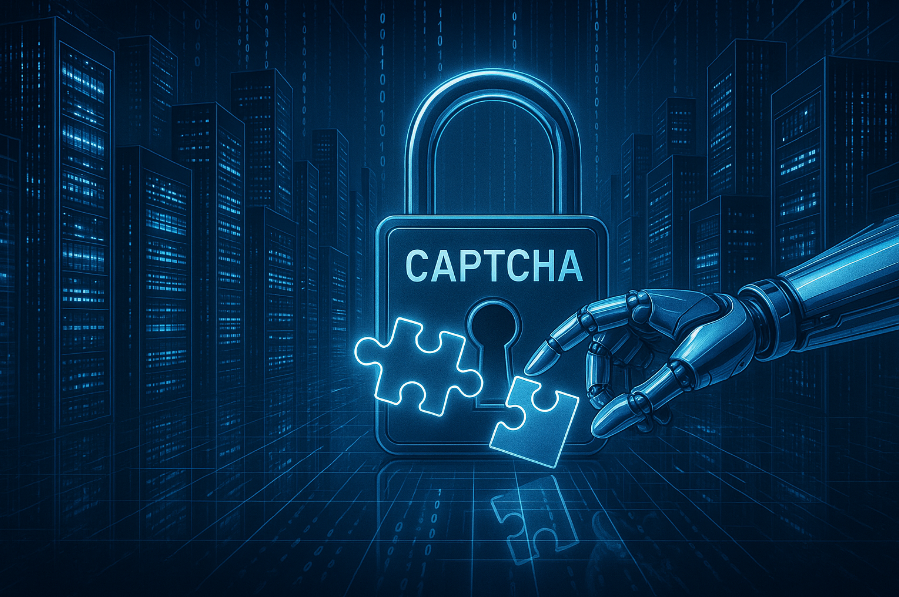
Approaches to Captcha Solving: Human, AI, or Hybrid
Anti-captcha services differ by their recognition technologies:
- Crowdsourcing (manual solving by humans): This classic approach is implemented in services like 2Captcha (known as ruCaptcha on the Russian market) and AntiCaptcha. Hundreds or thousands of real people around the world act as operators, manually entering CAPTCHA answers for a small reward. The advantage: a human can solve almost any CAPTCHA, even complex or unusual ones that algorithms can’t handle. These services support the broadest range of CAPTCHA types, including local Runet CAPTCHAs (e.g., Yandex or VK) and intricate puzzles such as image rotation tasks. However, speed depends on queue and load: typically, you get an answer in 10–30 seconds, sometimes up to a minute for the hardest challenges.
- Artificial Intelligence (automatic solving via AI models): A new trend, offered by services such as CapMonster Cloud. Here, CAPTCHAs are recognized by neural networks with no human involvement. This results in instant speed-solutions in fractions of a second or just a few seconds for common CAPTCHAs-and very low cost, since there’s no need to pay a large pool of workers. For example, CapMonster Cloud advertises an average solve time of <1 second and support for major CAPTCHA types (reCAPTCHA v2/v3, hCaptcha, GeeTest, Cloudflare Turnstile, etc.) with accuracy up to 99%. Pricing is impressive too: basic CAPTCHAs cost $0.02 per 1,000, complex ones like reCAPTCHA are about $2 per 1,000-cheaper than “manual” services. The flip side: limited coverage and the risk of errors with CAPTCHAs the AI doesn’t know how to handle. Pure AI solutions still can’t solve complex interactive puzzles. For example, Arkose Labs FunCaptcha still only yields to humans-pure neural services like CapMonster can’t handle it.
- Hybrid Approach (AI + Human Combination): Used by SolveCaptcha and to some extent by DeathByCaptcha. Here, the neural network tackles common, simple CAPTCHAs, returning answers in 2–5 seconds, but if it meets an unfamiliar or overly challenging CAPTCHA, a human operator is involved. This balances speed and reliability: most cases are solved instantly, while exotic types are guaranteed to be solved by a human. SolveCaptcha, a relatively new player, markets itself as a powerful and fast universal CAPTCHA breaker. Its API is fully compatible with 2Captcha’s HTTP methods, making migration straightforward for developers. DeathByCaptcha historically implemented a hybrid OCR + human system for basic text CAPTCHAs, although modern reCAPTCHA and similar still rely on humans. Hybrid services cover practically all types: for instance, SolveCaptcha claims to support Google reCAPTCHA v2/v3, hCaptcha, Arkose Labs FunCaptcha, GeeTest, Cloudflare Turnstile, etc., with success rates of 95–99%. The reported speed impresses-independent tests show SolveCaptcha solves reCAPTCHA v2 in ~4.5 seconds on average (compared to ~20 seconds for 2Captcha). The hybrid approach can significantly save time on task streams.
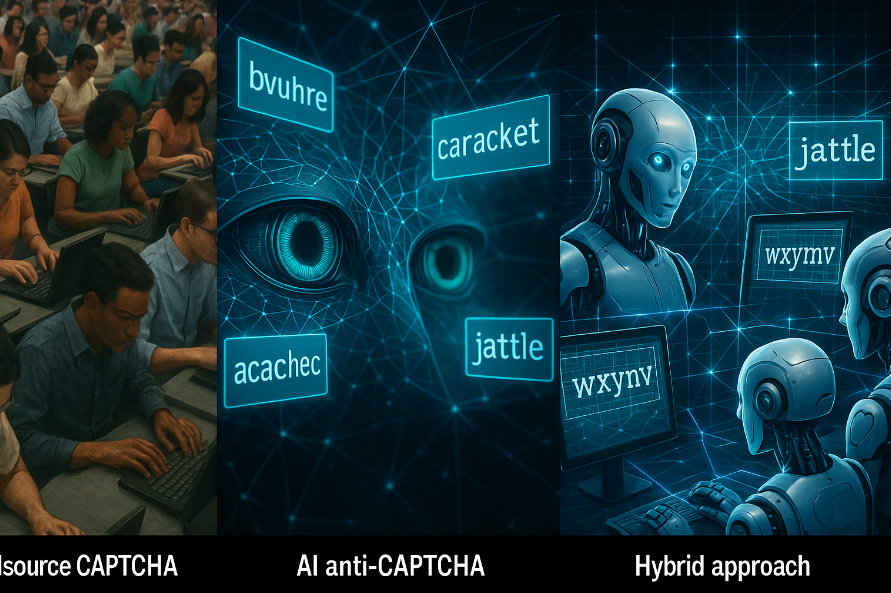
So, your choice of technology influences speed, cost, and coverage. Let’s look at what this means for various scenarios.
SEO Parsing: Bulk Data Collection from Websites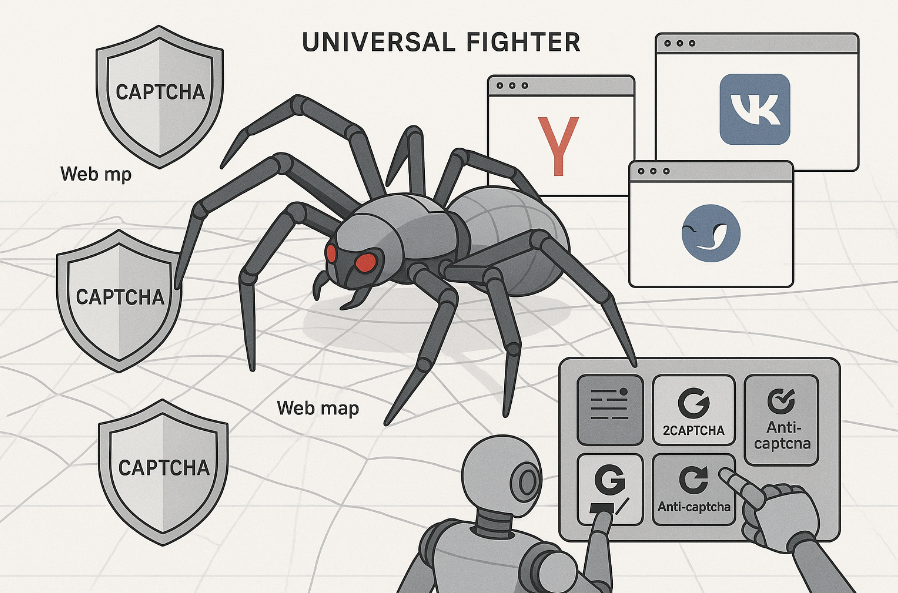
SEO parsing involves automated data collection from search engines and websites (such as parsing search results, page content, SEO metrics, etc.). These scripts usually generate many, often simultaneous, requests and encounter CAPTCHAs of various types. Here, three factors are critical:
- Coverage of CAPTCHA Types: A parser might encounter CAPTCHAs anywhere-Google search will present reCAPTCHA, other sites may use hCaptcha or GeeTest, and local Russian services may show Yandex CAPTCHA or VK. Thus, services with maximum coverage are preferred. Leaders here are 2Captcha and AntiCaptcha, which over years have added support for everything on the market-including rare and new types. If a new CAPTCHA format appears, these services are typically among the first to add it, as their large pool of workers can handle niche challenges. SolveCaptcha is equally comprehensive due to its human reserve; it’s a universal solution (~95% of CAPTCHAs covered immediately). Purely algorithmic services may lag here: CapMonster Cloud focuses on widespread CAPTCHAs (reCAPTCHA, Cloudflare, hCaptcha, etc.) and doesn’t support rare types like Yandex CAPTCHA or complex puzzle variants. In SEO parsing, where you never know what protection will surface, it’s safer to have a “universal fighter.”
- Solve Speed and Stream Processing: When crawling thousands of pages, every second per CAPTCHA affects overall parsing speed. For simple CAPTCHAs (basic text images), AI services are noticeably faster. OCR algorithms read text in fractions of a second, while a human takes ~5–10 seconds to type in the answer. For instance, DeathByCaptcha often solves text CAPTCHAs automatically in ~9 seconds, SolveCaptcha’s neural net in 3–5 seconds, whereas a 2Captcha operator takes about 10 seconds when load is light. For a single request, the difference isn’t critical, but with large streams, the time savings add up. However, with complex CAPTCHAs (reCAPTCHA, Cloudflare, etc.), the gap narrows: major services typically return results within 20–30 seconds. SolveCaptcha sometimes leads (with optimizations, can deliver reCAPTCHA v2 in seconds under ideal conditions), 2Captcha averages 10–20 seconds, AntiCaptcha about 20 seconds, DBC up to 30 seconds. Overall, all handle even difficult CAPTCHAs in about half a minute. Therefore, in SEO parsing where CAPTCHA types vary, hybrid services win time on simple challenges, while manual services aren’t far behind for the tough ones. More important is the ability to scale across many parallel streams.
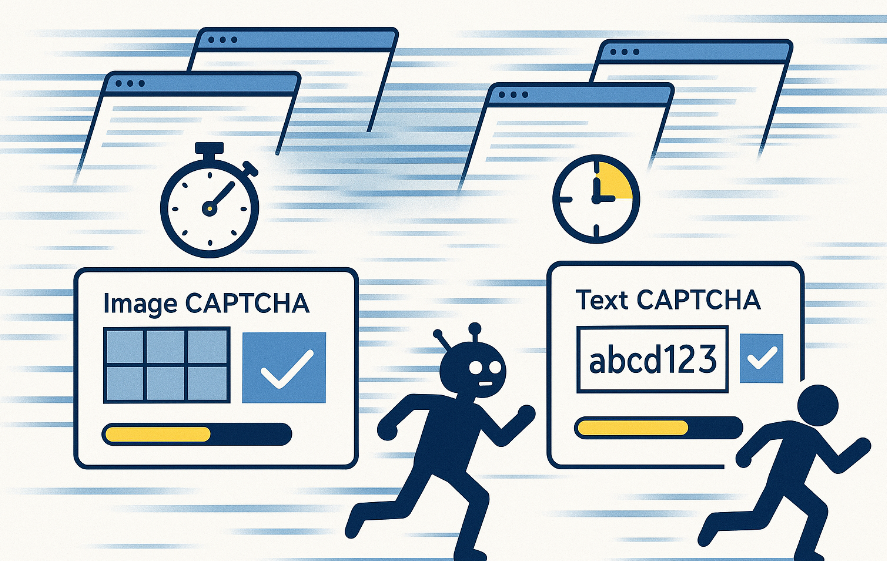
- Scale and Parallelism: Parsing is often launched in batches, with many requests at once. Thus, it’s crucial how many CAPTCHAs a service can solve simultaneously. 2Captcha handles hundreds of requests per second thanks to a vast online workforce-you can send 500+ tasks, and the system will process them. If traffic is huge, average solve time may climb slightly due to queue length, but there’s no hard limit. SolveCaptcha also targets mass use: it supports up to ~12,000 image CAPTCHAs or ~11,000 reCAPTCHA v2 in one minute for free, with upgrades available above these thresholds-enough even for heavy-duty parsers. DeathByCaptcha is weaker in this metric: under heavy load, solve times may increase and even cost surcharges apply in peak hours. For reliability, many developers use multiple services in tandem (their APIs are similar). For example, set up a fallback: if the primary service doesn’t respond in X seconds, send the CAPTCHA in parallel to another. Conveniently, the 2Captcha API is now de facto standard, and most solutions (SolveCaptcha, CapMonster, etc.) are compatible, simplifying combinations.
Conclusion for Parsing:
If you’re building a universal crawler and need reliability and wide coverage, 2Captcha or AntiCaptcha are trusted choices-they solve any encountered CAPTCHA reliably and swiftly. They are also best for local resources (e.g., parsing Yandex SERP with its CAPTCHA). If the parsing targets Western sites with standard CAPTCHAs and you want maximum speed, consider SolveCaptcha-the hybrid AI shaves seconds off each solution. For mass processing with homogeneous CAPTCHAs (e.g., bypassing Cloudflare by the tens of thousands), add CapMonster Cloud for cheap, rapid acceleration: it handles simple CAPTCHAs for pennies and milliseconds, with tricky ones handed off to human-powered services as fallback. Crucially, ensure your target CAPTCHA type is supported by the AI (if an image rotation puzzle appears, CapMonster may skip it).
Mass Account Registration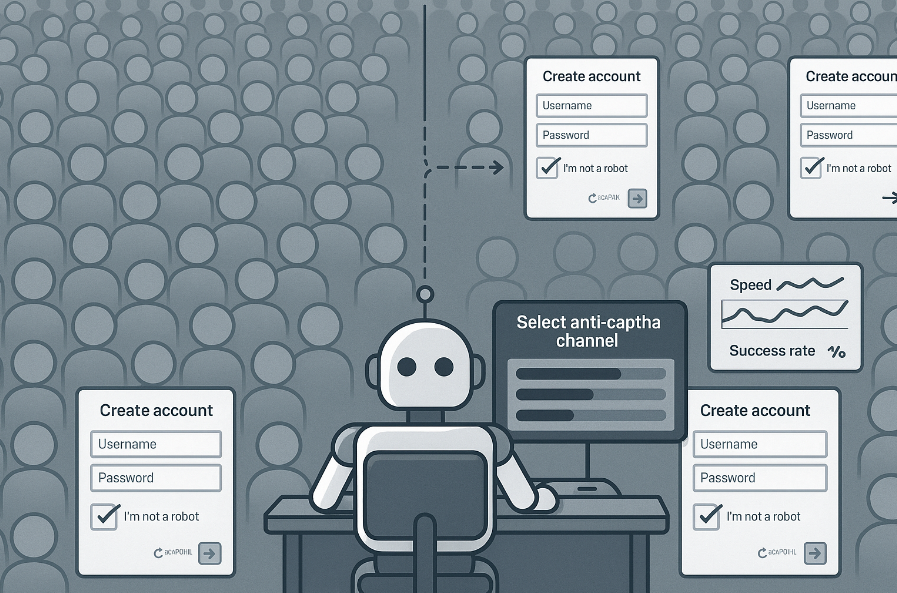
When automating bulk account registrations (for social networks, gaming services, email, etc.), you almost always need to bypass CAPTCHAs. Typical checks here include reCAPTCHA v2/v3, hCaptcha, or simple graphic CAPTCHAs in the registration form. The goal is to maximize registration speed without compromising CAPTCHA solve rates, and to stay within budget-since you may need to create hundreds or thousands of accounts.
Key Features and Recommendations:
- ReCAPTCHA and Speed: Google reCAPTCHA remains the most common challenge during registration. Solving it usually takes the longest, as it requires a request to Google for a token. SolveCaptcha leads in reCAPTCHA speed-its average reCAPTCHA v2 solve time is about 4–5 seconds, whereas 2Captcha is about 20 seconds (occasionally 1–5 seconds if a ready worker is available, but usually not faster than 10 seconds). AntiCaptcha provides a reCAPTCHA token in about 10–20 seconds. The difference is real: when registering hundreds of accounts in sequence, saving about 15 seconds per CAPTCHA adds up to hours. SolveCaptcha also optimizes for reCAPTCHA-using Google-authorized solvers, occasionally returning a response in as little as 1–2 seconds under ideal conditions. On average, SolveCaptcha is the fastest; next comes 2Captcha, with manual-only DeathByCaptcha lagging (15–30 seconds).
- Concurrent Registration: If you need to register accounts in parallel (100+ threads), the bulk-handling abilities of the service matter. Here, AntiCaptcha stands out for withstanding heavy loads without quality loss. 2Captcha also supports high concurrency, but be aware: when launching a large number of registrations simultaneously, solve times may rise gradually, as all tasks queue together (e.g., 50 CAPTCHAs solved in ~20 seconds; if you send 500 at once, some might wait up to a minute). SolveCaptcha advertises very high throughput (tens of thousands per minute), which in practice means no bottleneck for most use cases. For parallel mass registration, all three main services are suitable. Legacy solutions like DBC can hike prices or show instability during load-better kept as backups.
- Bulk Pricing: Financially, 2Captcha/AntiCaptcha charge around $1–3 per 1,000 reCAPTCHAs. SolveCaptcha tries to undercut: reCAPTCHA v2 costs about $0.55 per 1,000, v3 at about $0.80 per 1,000-noticeably cheaper than $1. For mass registration, saving 2–3x the budget matters. Moreover, SolveCaptcha offers newcomers a free trial package to test the service risk-free. CapMonster Cloud is even cheaper: 50–194 RUB (approx. $0.5–2) per 1,000 reCAPTCHAs, depending on complexity, and basic CAPTCHAs are mere pennies (1.8–3.5 RUB per 1,000, i.e., $0.02–0.05). The difference is huge. If you need to register tens of thousands of accounts, combining approaches makes sense: first attempt a solve via CapMonster Cloud; if unsuccessful or timed out, revert to 2Captcha. CapMonster only charges for completed solves, lowering average costs without quality loss.
Conclusion for Mass Registration:
Hybrid and AI-powered solutions are recommended for speed and savings. SolveCaptcha is the optimal pick for bulk registration thanks to fast reCAPTCHA solves and low per-thousand prices. It’s also simple to integrate (same API as 2Captcha) making it easy to add to registration scripts. 2Captcha/ruCaptcha and AntiCaptcha are valuable for their reliability and as fallbacks if the AI fails or a rare CAPTCHA must be solved. They’ve proven themselves over years, yielding high registration success even on complex sites (albeit slightly slower). CapMonster Cloud can significantly speed up and cheapen processes for supported, repetitive CAPTCHAs-excellent for mass homogeneous registrations, delivering solves in seconds. But remain mindful: any AI failure requires switching to a manual service, so monitor results and always have a fallback.
Bypassing CAPTCHAs in Mobile Games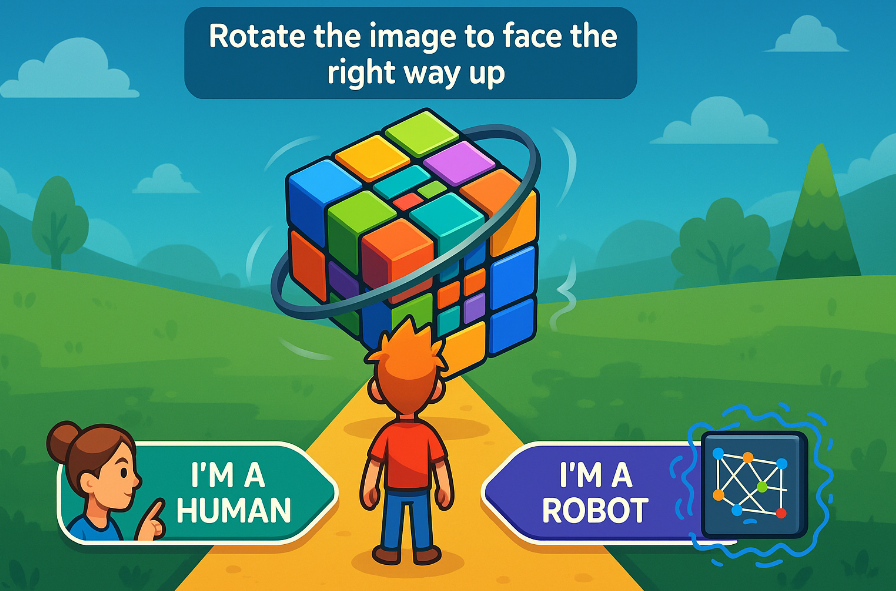
Mobile games and apps increasingly implement CAPTCHAs to protect against bots (especially popular in competitive games or during bonus events, where bot scripts may swarm). An example is the Arkose Labs FunCaptcha system, used by a number of games and applications. These are complex interactive puzzles, considered some of the most difficult to solve automatically. Other variants include embedded browser webviews with Google reCAPTCHA or hCaptcha during game account logins.
Key Features and Recommendations for Game CAPTCHAs:
- Difficult Interactive CAPTCHAs (FunCaptcha, etc.): If a game uses Arkose Labs (or a similar advanced system), the choice of service narrows to only those capable of solving such challenges. Practice shows human operators are still irreplaceable-no pure AI currently succeeds at 3D puzzles with 100% accuracy. Thus, you should choose either a crowdsource or a hybrid service. Both 2Captcha and AntiCaptcha support FunCaptcha and similar puzzles by redirecting them to human solvers. SolveCaptcha handles FunCaptcha as well: the neural network may accelerate certain stages, but ultimately a human operator will likely provide the final answer. Don’t expect miracles for speed-typically 40–50 seconds per CAPTCHA. Tests show SolveCaptcha can handle FunCaptcha in ~48 seconds on average, 2Captcha in ~55 seconds, so both are similarly capable. While not lightning-fast, a bot can pass the check in under a minute-better than being permanently stuck. CapMonster Cloud and similar services are powerless with FunCaptcha. So, for games with highly sophisticated CAPTCHAs, the choice is clear: use services with live human operators (in any form). Here, 2Captcha, AntiCaptcha, and SolveCaptcha all fit, with differences mostly in nuance (SolveCaptcha may be slightly faster due to its hybrid system; 2Captcha has a larger Russian-speaking community and more integration guides). Additionally, DeathByCaptcha deserves mention: its smaller userbase now also handles Arkose FunCaptcha.
- Regular CAPTCHAs in Mobile Apps: Some games or apps may use simpler challenges, like Google reCAPTCHA in webview authentication, hCaptcha for suspicious transactions in in-game stores, etc. In such cases, the approach is similar to websites: hybrid services win for speed. If your bot runs on an Android emulator and encounters reCAPTCHA, SolveCaptcha can solve it in a few seconds (in the best case) or just several seconds in most cases; 2Captcha/AntiCaptcha will take around half a minute. The difference is crucial when a bot executes a sequence of operations, each potentially triggering a CAPTCHA: waiting 30 seconds for each slows the bot dramatically. Thus, for dynamic scenarios, SolveCaptcha excels by minimizing delays. However, games often introduce new CAPTCHA types or anti-bot measures-so reliability remains vital: 2Captcha or AntiCaptcha can bail you out where AI fails. The balance: exploit AI for speed, but always maintain a fallback channel.
Summary for Games:
Use hybrid or human-powered services for game CAPTCHAs. SolveCaptcha and 2Captcha are the two main options: the former offers maximum speed for standard challenges; the latter, time-proven stability and deep community experience (many ready-to-use solutions, integration scripts for different languages and bot engines). For games where CAPTCHAs appear rarely but are highly complex, send them directly to 2Captcha/AntiCaptcha to avoid wasting time-here, speed is human-limited (~50 sec), and extra AI won’t help. If CAPTCHAs occur often and are mostly standard (e.g., reCAPTCHA), run everything through SolveCaptcha to save 20+ seconds each time. Use CapMonster Cloud for mobile games only in simple scenarios-e.g., if the game pops a web page with Cloudflare or reCAPTCHA that CapMonster supports; then you’ll breeze through instantly and cheaply. But remember: for truly tough cases (common in gaming), human input remains essential.
Bypassing CAPTCHAs in E-Commerce (Online Stores)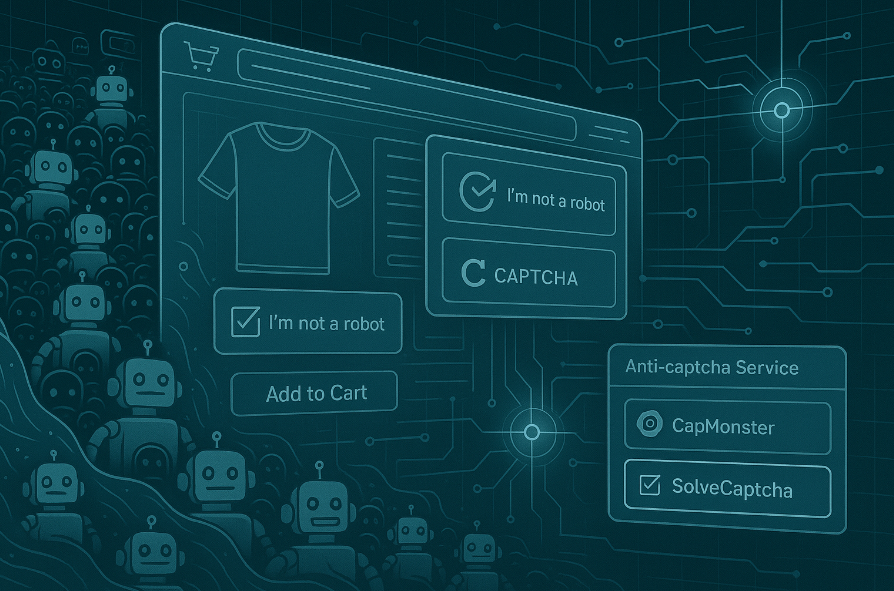
Online stores and marketplaces actively defend against bots, especially those that mass-scrape prices, place fake orders, or purchase limited stock using scripts. That means scripts for e-commerce-monitoring product availability, auto-purchasing, site content parsing-will almost certainly face CAPTCHAs. The key characteristics of this environment:
- Cloudflare and Web Shields: Many stores rely on Cloudflare or similar services, which may present a JavaScript challenge or CAPTCHA (Turnstile, hCaptcha) upon suspected bot activity. Cloudflare Turnstile in particular is more user-friendly, but for bots, it still needs to be solved. The good news: all major anti-captcha services now support Cloudflare CAPTCHAs. For example, SolveCaptcha expressly supports Cloudflare Turnstile along with reCAPTCHA and other types. 2Captcha/AntiCaptcha can also solve Cloudflare (including old IUAM calls, new Turnstile, and even complex Graphical Challenges)-typically assigned as a variant of reCAPTCHA or another challenge with relevant parameters. CapMonster Cloud puts special emphasis on Cloudflare protection: it supports Turnstile, Cloudflare Bot Challenge (the JavaScript confirmation requiring full browser emulation), and can automatically plug in the needed proxies. Furthermore, when solving CAPTCHAs through CapMonster, proxies are included in the price-the service itself selects and connects a suitable proxy server (for reCAPTCHA, Cloudflare challenges, etc.). For the developer, this simplifies things: there’s no need to buy or rotate proxies-a common requirement when using 2Captcha/AntiCaptcha (where with reCAPTCHA you often need to supply your own proxy to obtain a token from the right region). For parsing stores under Cloudflare protection, CapMonster Cloud can be extremely efficient-fast, inexpensive, and minimal setup.
- Price and Data Scraping: When a script browses product catalogs and hundreds of pages, both Cloudflare and site-internal CAPTCHAs (e.g., basic text “enter the code you see” after N requests) may appear at any time. Here, long-term stability matters most. If you’re running competitive price analysis and your bot crawls the site for hours, the anti-captcha service must operate 24/7 with no downtime or delays. Here again, 2Captcha and AntiCaptcha lead-their infrastructure is geared for stability with near-constant uptime. They support fine tuning such as custom proxies, custom headers emulating real shoppers, etc., to maximize human-like requests. SolveCaptcha doesn’t require such fine control; it aims for full automation. If you just need to crack a regularly appearing CAPTCHA, it works out of the box.
- Flash Sales and Botting: A special case-bots storming sites during sales or product launches (e.g., new console or graphics card restocks), attempting to place orders before anyone else. Here, every second counts, and CAPTCHA is the main brake. The strategy is as before: fastest service wins. SolveCaptcha or CapMonster can solve CAPTCHAs in 3–5 seconds; a human operator will need 10–15. Those precious seconds may decide whether your bot succeeds in buying the item. Thus, neural anti-captcha solutions are now essential: they give you an edge. Many purchase bots (sneaker bots, drop bots, etc.) are now integrated with services like CapMonster Cloud-to blast through CAPTCHAs instantly and maximize speed. But don’t overuse this-algorithmic solutions work best with standard CAPTCHAs. If the retailer deploys something novel (say, an image selection puzzle no AI recognizes), your bot risks stalling. The optimal strategy: combine approaches, using AI for speed but keeping a manual fallback. Thankfully, switching between services is easy-CapMonster can impersonate 2Captcha’s API, so one piece of code can call CapMonster first, then 2Captcha as a backup.
Conclusion for E-Commerce:
When building parsers and bots for online stores, tailor to the protection type. For Cloudflare/reCAPTCHA, use SolveCaptcha or CapMonster for speed, especially when tasks must be performed quickly. For sophisticated, custom CAPTCHAs, stick with 2Captcha/AntiCaptcha-these will solve anything manually and can be tuned to your scenario. The ideal is a combination: 2Captcha (or AntiCaptcha) plus SolveCaptcha gives you guaranteed coverage and speed optimizations on common types. Adding CapMonster Cloud lowers costs for large volumes of routine tasks. This way, you cover every base: fast solutions where possible; guaranteed solutions where necessary. Conveniently, all the listed services have compatible integration principles, so it’s relatively easy to combine them in one project.
Conclusions
The captcha-solving service market offers solutions for virtually any scenario. There is no single “best for everything” service-each has its specialization and core strengths: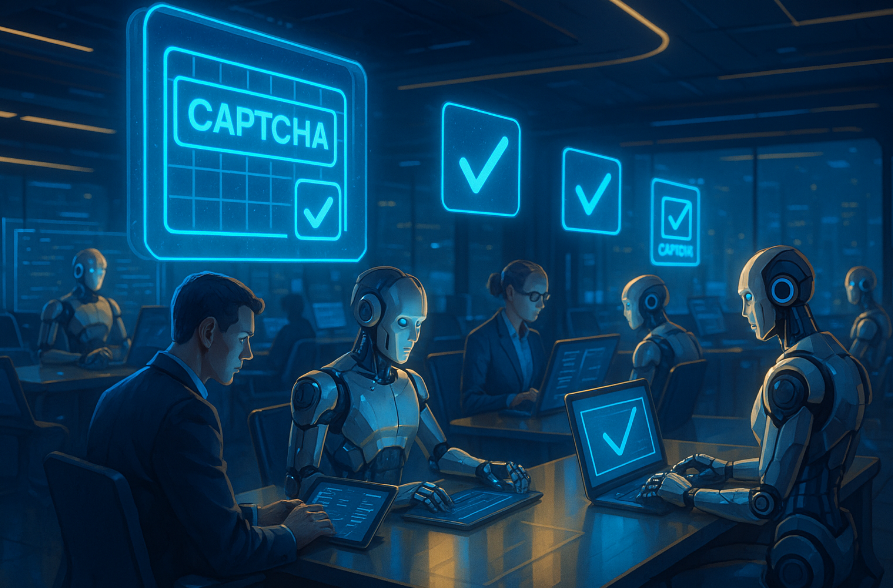
- 2Captcha (ruCaptcha): The veteran and “universal soldier.” Thanks to its large crowd workforce, it can tackle practically any CAPTCHA, even if sometimes it’s slower than competitors. Ideal when reliability and wide coverage matter-SEO parsing, regional/rare CAPTCHAs, uncommon challenges. 2Captcha’s API has become the industry standard, integrating anywhere with many prebuilt libraries. If speed is not critical but a guaranteed pass-through is needed, 2Captcha is nearly a foolproof choice.
- SolveCaptcha: A promising newcomer focused on speed and convenience. Its hybrid “AI + human” model quickly handles 95% of CAPTCHAs, saving seconds on every task. Best for situations needing rapid, high-volume solves: Google parsing, registration through reCAPTCHA, cloud challenges-anywhere each CAPTCHA must be solved as quickly as possible. Developers praise modern documentation, SDKs for various languages, and Selenium/Puppeteer support out of the box-so integrating SolveCaptcha is no harder than 2Captcha. All other things being equal, if speed is your priority, SolveCaptcha is an excellent choice.
- AntiCaptcha (AntiGate): The choice for large enterprises and advanced scenarios. It stands out with support for expanded workflows-you can solve not just standard CAPTCHAs, but multi-step custom challenges using Custom Tasks. Handles massive concurrency (thousands of CAPTCHAs/min), making it valuable for 24/7 platforms and services. Documentation and extra tools (browser plugins, Selenium modules, etc.) enable seamless integration into any infrastructure. Speed is similar to 2Captcha-sometimes faster due to specific optimizations (reCAPTCHAs ~10 sec). Prices are standard, with options for prepaid bulk packages.
- DeathByCaptcha: An industry pioneer now less popular but still relevant. Its strengths are compatibility and unique features. DBC supports competitor API protocols (you can send tasks in AntiCaptcha format, and DBC will process them)-useful for backup workflows. The hybrid OCR+human system saves some time on simple CAPTCHAs. Overall, DBC is best as a supplement: for example, if 2Captcha is overloaded, DBC can grab a share of the jobs-switching is technically easy. It’s now rarely chosen for primary scenarios, unless legacy software is designed for DBC.
- CapMonster Cloud: A prime example of the new generation of fully automated AI anti-captcha services. It offers unmatched speed (<1 second) and cost for high-volume, uniform CAPTCHAs. Ideal where thousands of CAPTCHAs need solving and they’re all similar: massive parsing, view bots, product bots-anywhere saving even fractions of a second and slashing budgets are essential. Especially attractive to SEO specialists: a Zennolab product, CapMonster quickly gained users by virtually eliminating the CAPTCHA pain point for large workloads. However, keep limitations in mind: CapMonster cannot solve what its AI doesn’t know. New or complex CAPTCHAs can stump it until algorithms are updated. So, relying solely on AI for mission-critical tasks is risky. But paired with a traditional service, it’s a powerful asset. The future of anti-captcha clearly points toward such solutions, and the share of CAPTCHAs handled by AI will only grow.
For every task, choose your service wisely. Sometimes speed is paramount (favoring neural nets and hybrids), sometimes 100% solve reliability and maximum coverage are vital (human-powered platforms win), and sometimes cost per million requests is decisive (here, only AI will suffice). You can and should combine services in your tools, extracting the best from each: send CAPTCHAs first to SolveCaptcha for a quick solution, and if not solved, try 2Captcha as your guarantee. Or use CapMonster Cloud for 90% of trivial CAPTCHAs, sending the toughest 10% to AntiCaptcha. Modern anti-captcha services are mutually compatible and integrate in minutes, so each one’s specialization is an advantage, not a problem-use the right tool to achieve your goals more efficiently.